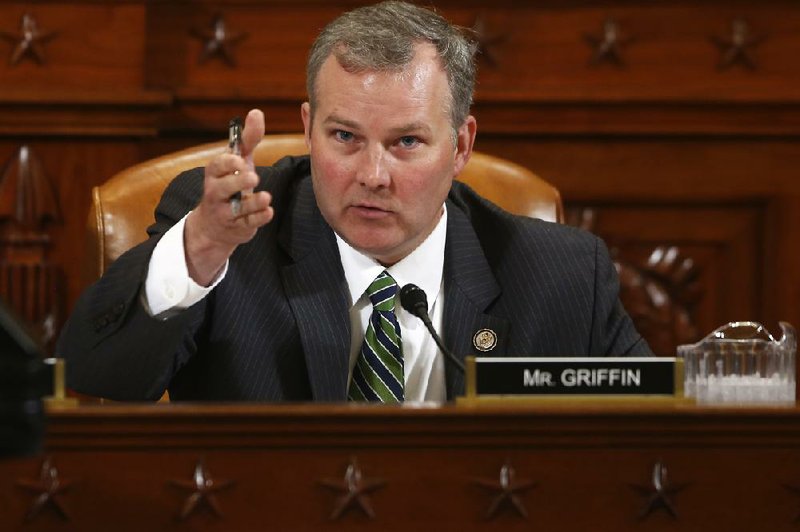WASHINGTON - Members of six conservative groups told a congressional committee Tuesday that the Internal Revenue Service subjected them to inappropriate scrutiny simply on the basis of their beliefs.
Becky Gerritson, president of the Wetumpka [Alabama] Tea Party, told members of the House Ways and Means Committee that the IRS slow-walked her group’s application for tax-exempt status for more than a year and a half and asked her for more than 90 pieces of information, including the names of all of her volunteers and donors, detailed descriptions of every event the group has held and copies of all the information the group has put on the Internet, including postings on Facebook, the social-networking websites.
“This was not an accident,” she said. “This was a willful act of intimidation intended to discourage a point of view.”
Republicans on the committee, including Rep. Tim Griffin of Arkansas, said the IRS scrutiny on conservative groups chilled free speech.
Michigan Republican Rep. Dave Camp, chairman of the committee, said the IRS acted through a “culture of intimidation.”
“We’ve gone beyond chilled,” said, Rep. Mike Kelly, a Pennsylvania Republican. “The American people are frozen with fear.” Some Democrats on the committee shared Republicans’ anger. Rep. Sander Levin, the panel’s ranking Democrat, called the agency’s actions “worse than inappropriate,” and Sen.Charles Rangel, a New York Democrat, said there was a “cancer” in the IRS that needed to be excised.
But Rangel and other Democrats said the IRS’ scrutiny on the conservative groups stemmed from the 2010 Supreme Court decision in Citizens United v. Federal Elections Commission. The ruling allowed corporations, including nonprofits,to contribute to elections. The ruling also affirmed the ability of 501(c)4 groups’ (social-welfare organizations known by the area of federal tax code that governs their tax treatment) to keep their donors private if they limited their political involvement.
Rangel suggested that partisan organizations were going “undercover” by pumping money into 501(c)4 groups to hide the donors’ identities.
“If you are a Democrat, put it out there,” Rangelsaid. “If you are a Republican, put it out there. I don’t know if our country can afford to be using charitable organizations to get candidates elected.”
“No one has a God-given right to tax-exempt status,” said Rep Bill Pascrell, a New Jersey Democrat.
Each of the six witnesses Tuesday represented conservative groups. Camp said Democrats had been offered an opportunity to question liberal groups in a similar situation, but the Democrats didn’t produce a witness.
Levin, the committee’sranking Democrat, said the IRS inspector general’s report showed that not all of the targeted groups were conservative. The audit, he said, showed that of the 298 applications set aside for increased scrutiny, 96 contained the words “Tea Party,” “9/12,” or “Patriots.” Each are terms associated with conservative groups.
“This is not a Democratic or Republican issue,” he said.
Griffin disagreed. He said Democrats were trying to focus on the Citizens United case to obscure that conservative groups were targeted.
“It’s not a debate over the law,” he said. “Some groups were given a pass, and some groups weren’t.”
Griffin said the initial inspector general’s report shows only a portion of the IRS wrongdoing. He predicted that congressional investigations and additional internal reviews will uncover more.
“It was an audit,” he said, referring to the inspector general’s report. “There were no e-mails requested, no depositions. It justscratched the surface.”
Griffin said the IRS overreach was an indication that the tax code needs to be simplified.
“If you want to reduce the abuse and the power of the IRS, we need to reduce the complexity of the tax code they enforce,” he told the witnesses, adding: “I would encourage you to explore all your options. You ought to use every tool you can to hold this government accountable.”
Some Democrats argued that while the IRS may have been guilty of mismanagement, social-welfare groups that deal with political issues can expect interest from the federal tax agency.
“It’s important taxpayers know which side you fall on,” said Rep. Jim McDermott, a Washington state Democrat.“Each one of your groups is political. You’re asking the American public to subsidize your work. We’re talking about a tax break.”
Rep. Paul Ryan, a Wisconsin Republican and unsuccessfully vice presidentialcandidate in 2012, responded that Democrats seemed to be criticizing conservative groups for exercising their First Amendment rights.
“So you’re to blame,” Ryan told the witnesses, dryly. “I guess that’s the message here.”
John Eastman, chairman of the National Organization for Marriage, told lawmakers that the IRS had committed a felony by disclosing the names of the organization’s donors during a debate over California’s Proposition 8, a 2008 ballot measure that defined marriage as being between a man and a woman.
Eastman’s group supported the ballot measure. He said he felt “shock and disgust” when he saw his donors’ names and addresses listed on the website of the Human Rights Coalition, a group that supports gay marriage and that Eastman described as his biggest political adversary. After the names were published, Eastman said, donors’ property was vandalized and their businesses were boycotted.
“Our donors tell us, we are fearful of giving money to you, because our businesses and families are at risk,” Eastman said.
Since May 14, when the IRS inspector general’s office issued a report outlining the targeting of political groups, the acting agency commissioner Steve Miller resigned and his replacement, Daniel Werfel, began a 30-day review of the allegations. Werfel put Lois Lerner, who was director of the Exempt Organization Division that dealt directly with groups seeking 501 (c) 4 status, on administrative leave. Lerner has declined to answer congressional inquiries and claimed her Fifth Amendment right against self-incrimination.
Members of the Ways and Means Committee suggested Tuesday that more change at the agency, or in the Obama administration, is to come.
“The abuse was systematic,” said Erik Paulsen, a Minnesota Republican. “The larger question is, who helped direct this activity.”
Front Section, Pages 7 on 06/05/2013
